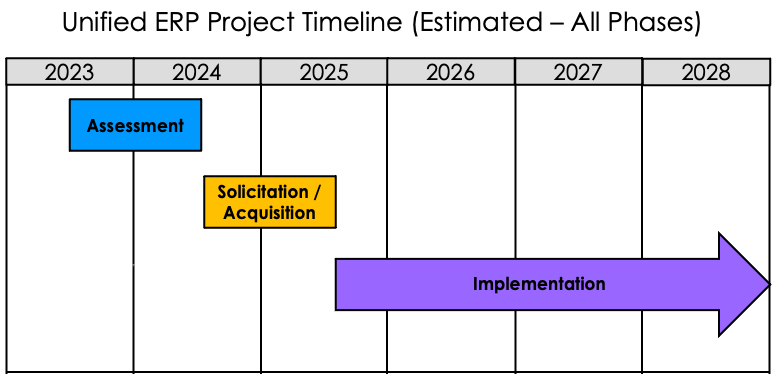Timeline
The Unified ERP Project timeline encompasses three main phases: Assessment, Solicitation/Acquisition, and Implementation.

We are currently in the Solicitation/Acquisition Phase through June 2025.
Each phase of the Unified ERP Project has unique objectives associated with it:
Assessment Phase
- USG Assessment - USG will review the State's solution to determine if its higher-education-specific requirements can be satisfied.
- Planning and Requirements Gathering - USG will solicit the expertise of the Information Services Group (ISG) to deliver a current state assessment, define a comprehensive list of HR, financial, and student system requirements, and develop an implementation roadmap to support the acquisition and implementation of a system-wide Unified ERP solution.
Solicitation/Acquisition Phase
- Solicit Information - USG Procurement will solicit information from various SaaS providers.
- SaaS Platform Evaluation and Selection - A team of Institution and System Office personnel will review the proposals and recommend a solution for USG's Institutions.
- System Integrator Evaluation and Selection - A team of Institution and System Office personnel will review and recommend a third-party integrator to assist with Unified ERP implementation.
Implementation Phase
- Plan and Design - Development of comprehensive project schedule. Affirm budget. Assemble teams. Design solutions to satisfy requirements. Map legacy data to SaaS-based system. Agree to standard configuration and attributes.
- Build - Configure extensions. Build conversions and integrations. Conduct iterative design reviews with stakeholder communities.
- Test - Conduct structured testing with Institution teams to validate business processes (end-to-end). Develop shared training curriculum for Institutions to leverage in their local deployments.
- Deploy - Migrate ITS-supported Systems to SaaS-based solution. Initiate phased onboarding of Institutions.
- Stabilize - Stabilize the system and support organization. Provide post go-live support through the final deployment and registrations.
